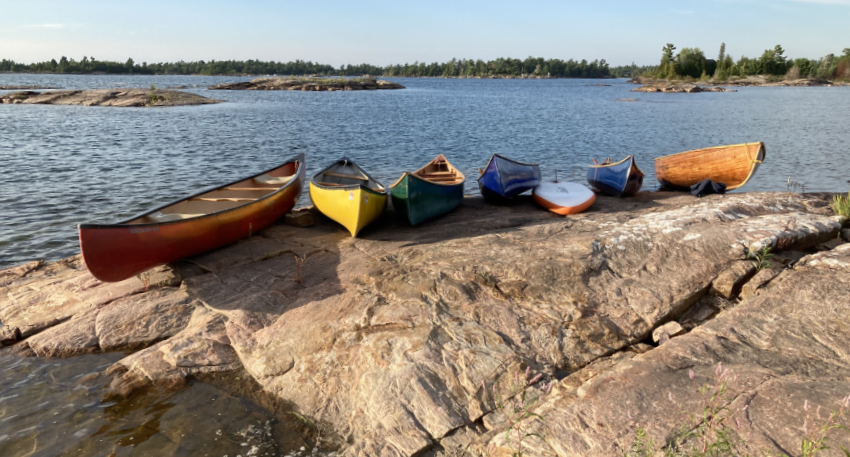
by David Macfarlane
I always used to like summers in the city. Summer evenings, in particular. There was an apartment I once had in downtown Toronto. It had a flat gravel roof that was reached by climbing over the railing of the fire escape, and on Friday evenings my girlfriend and I sat there on a pair of dilapidated patio chairs, sipping martinis, reviewing our week, planning our weekend. The air was thick with the day’s declining heat and with the perfume of a locust tree that was growing at the edge of the parking lot below. We savoured the cold gin and watched the soft blue sky turn to the dark purple of urban night. The glittering bank towers rose up around us. The air conditioners hummed. The traffic was a low, constant rumble. We couldn’t have been happier. Or so we thought.
Until we got married. Until we had children. And then, summer in the city became a different matter: wading pools filled with what, by the end of the day, was not exactly water anymore; the high anxiety of watching a wobbly tricycle a few steps from a lane of rush-hour traffic; ice-cream trucks that never, so we attentive parents noted, used the phrase “ice cream” on their signs; daily air-quality warnings; and, as night follows day, the inevitable arrival of asthma puffers in our house.
All this came to a head one day, six summers ago, when I stood with my two young children on a Toronto sidewalk, outside a litter-strewn downtown playground, waiting to enroll them in what looked a lot like school, however much care we took to call it “day camp.” It was a hot, humid morning. The air seemed to move only because it was swirled around us by so many passing cars. As we waited for the doors to open, I noticed a poor parched little pine tree. In some vain attempt at greenery, it had been plunked beside the entrance to the playground. I picked up a trace of its sweet gummy scent amid the surrounding gusts of exhaust. And at that instant I was visited with a memory of a long-ago world. I remembered a camp on Georgian Bay and a white frame cottage my parents rented for a few years on Lake Joseph.
Proust and his madeleines. Me and this pathetic little tree.
When I returned home, I announced to my wife that the following year we would be going up north. I believe my words were “for a real summer holiday.” I’m not sure which of us was more surprised. My wife, Janice, had no history of going “up north” herself; she grew up in Stratford, Ontario, and her summers revolved around the theatre. Insofar as we had ever discussed the matter, we felt ourselves lucky to have taken an approach to summer that avoided the laborious rituals of cottages. If ever I had felt nostalgic for boathouses and the rattle of oars in oarlocks and the great, wonderful sproing of an old jute-covered diving board, I had always doused the feeling quickly.
That was all past, I told myself. I was of the opinion that, having grown up in the 1950s and 1960s, I had experienced the last of the glory days of cottage life. Now it was all weekend traffic jams, high-powered boats, Jet Skis and undrinkable water, with boom boxes blaring across the lake from parties on houseboats. Today, you would no more swim across a channel in Lake Joseph — as we used to, on family picnics in the early 1960s — than you would rollerblade across the highway. And the camp I attended — and which, in my memory, was situated in a lonely, lovely, majestically unpopulated Georgian Bay landscape — is now so threatened with cruisers and insufferable Sea-Doos that campers are not allowed to go out in canoes on weekends. One might as well stay in the city, I figured. And so, until my decision that summers morning on the sidewalk, we did.
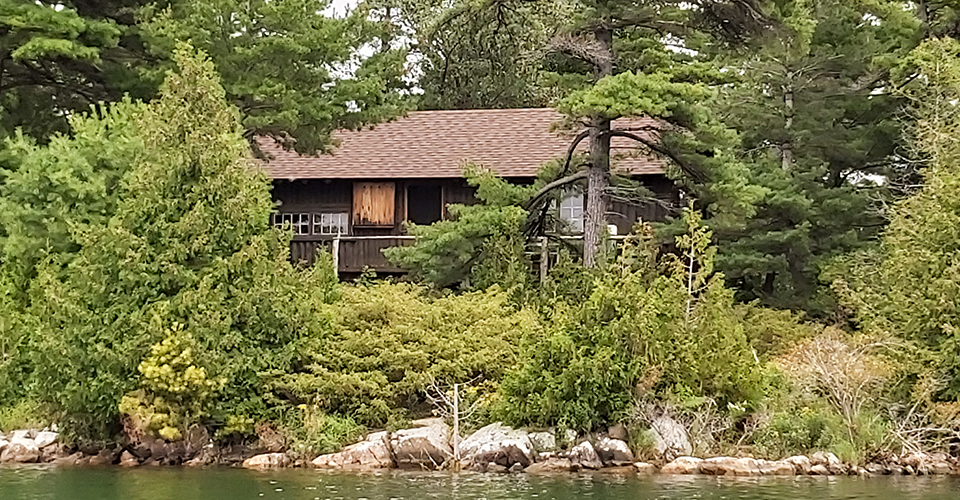
Howls of disbelief greeted my news, later that year, that I had found a cottage to rent. Disbelief because I had actually done something I said I was going to do. Howls because the cottage, as it transpired, was on an island, in Georgian Bay, and had no electricity, no running water and no telephone. This didn’t sound much like a holiday to Janice. Southern France sounded like a holiday. Tuscany sounded like a holiday. My wife pointed out — in case it had slipped my mind — that we had two young children. A phone might come in handy. So might a toilet.
Cut to our family’s slightly bewildered arrival at the end of a bumpy dirt road, at the bottom of an inlet an hour or so north of Parry Sound, Ontario. The couple from whom we intended to rent in August had suggested, once I told them of Janice’s misgivings, that we come up on the Victoria Day weekend by way of introduction to the place. They were kind enough to say that if Janice remained unhappy, we could back out of the arrangement.
We climbed out of the car. Janice took in the shallow, reedy bay, the grey sky, the black flies. I’d seen her look happier.
Our prospective landlords met us at the dock, and the sight of their boat was not a comfort. It was an old wooden Giesler — the boat of choice on the inlet. Gieslers are normally reliable, sturdy vessels, but this one had apparently encountered several decades worth of Georgian Bay shoals. It had only slightly less water between the gunwales than beyond them. Our daughter, age seven, looked at the ancient green Johnson ten-horsepower outboard and asked, rather pointedly, “When were motors invented?”
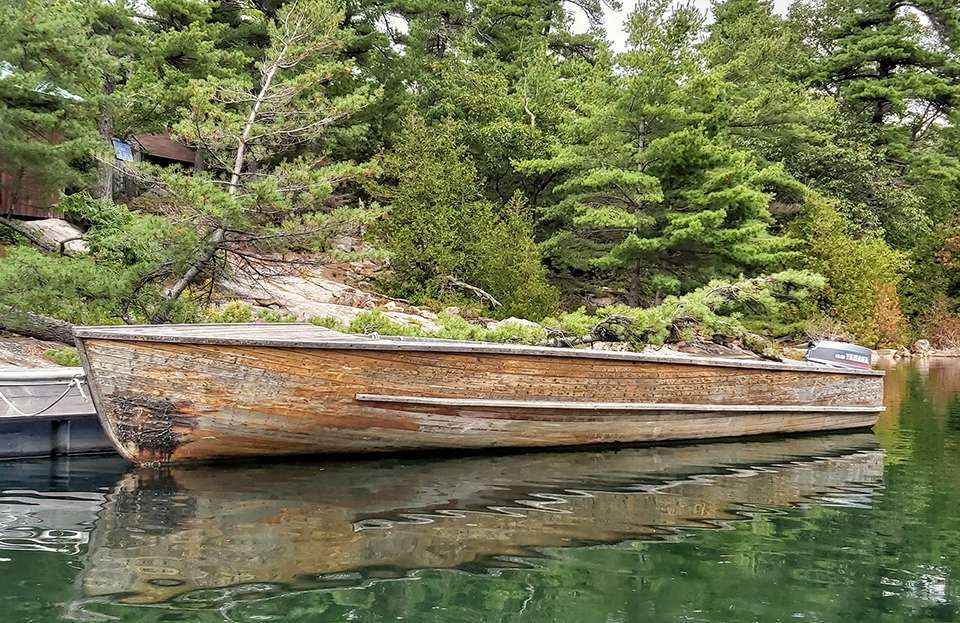
We loaded our luggage, bundled up the children in what looked likely to be entirely necessary life jackets and then puttered out of the little bay. And I do mean puttered. A heavy sixteen-foot Giesler, powered by one of the last hobbled survivors of the original ten-horsepower engine, does not move very quickly when laden with four adults, two children and the alarming quantity of gear the modern family requires whenever it so much as goes around the block.
But here, during this slow westward passage, the magic occurred. The bottom of the inlet disappeared astern (as did most of the flies), and the landscape around us shifted from pretty-but-generic northern lakeshore to the unique Group-of-Sevenish splendour of Georgian Bay: the smooth reaches of granite, the bent pines, the blue whitecapped water. On cue, the sun broke through the scattering clouds just as we first glimpsed the whale-like shoals and the mysterious distant islands of what, in Georgian Bay parlance, is called “the open.” Our landlord could see our reaction. He spoke over the irregular sputtering of his outboard. “I always wondered why I felt so much better whenever we came up to the Bay. It took me a while to realize it was a bit like being realigned. What we have here,” he said with a nod that included everything around us, “is the perfect balance of water, land and sky. I’ve never had my spine or my neck corrected by a chiropractor. But coming up to the Bay always seems to me like the psychological equivalent.”
And so it began. Janice had never seen anything like it — for the simple reason, really, that there is nothing quite like the northeastern shore of Georgian Bay, anywhere.
I can stare at it and stare at it (I’ve been doing so for six summers now) and never feel I get to the bottom of its perfection. The cottage was perfect, too: modest, unassuming, homespun, but with its own subtle splendour. It had a fireplace. A pretty little trail twisted through the woods to the outhouse. It had windward rocks where we could watch the sunset and a quiet, sheltered little back bay. The decidedly unfancy low-tech kitchen had everything that we needed, and every mixing bowl and spatula and bread tin was exactly where one would expect it to be. Long before anyone knew the word ergonomics, this cottage had been designed and furnished with utter simplicity, but with the efficient and logical use of space very much in mind. Even the wood stove had conveniences — warming oven, heat tray, hot-water chamber — that our city stove didn’t, and it turned out to be capable of quite precise temperature adjustments once the flue system was mastered.
And the views! There was not a single window in the place that didn’t frame a composition that deserved to be committed to oils.
We settled in. And that night, as the children slept and we sat in front of a fire, I asked Janice what she thought. I could tell that she was pleased. Still, we husbands aren’t used to being absolutely right. I expected something a little more equivocal. “I love it,” she said.
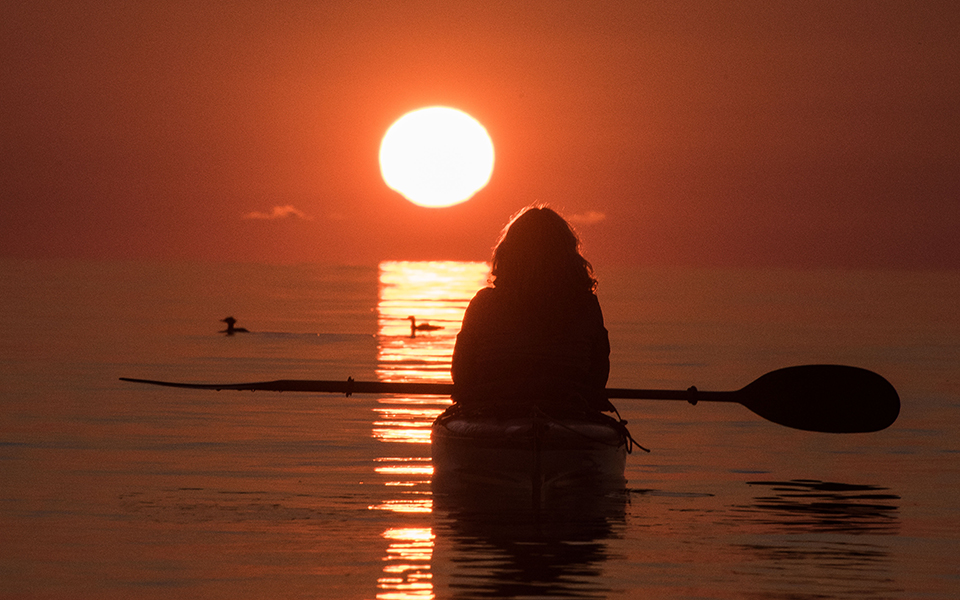
How much does she love it? How much does our family love what now are annual picnics on the reefs and our swims in the sandy channel and the afternoons spent reading or swimming or exploring in our canoe? How lucky do we feel that we have found a spot that has somehow avoided the worst and most noisome modernities of cottage life — where motorboat traffic is kept to a minimum and Jet Skies are deplored, where our neighbours paddle or row or sail and where the slow, peaceful elegiac passage of those brief but seemingly endless weeks of summer feel, I think, to our children, not so very different from the way they felt to me forty years ago?
Let me put it this way. Last year, I decided — unilaterally and for reasons that now escape me — that perhaps it was time for a European summer holiday.
In one remarkable hour of one remarkable day early in the spring, I made certain tentative arrangements. I won’t go into the details of how I accomplished this miracle. But that’s what it was: With two phone calls, I managed to pin down a house in southern France and a villa in Tuscany for six weeks in the summer — rent free!!!
Impossibly proud of my improbable success, I grandly made the announcement at dinner. Stunned silence. And then, at once, a howl of dismay from my daughter, from my son and from my cosmopolitan city girl of a wife. “You mean we’re not going to go to Georgian Bay?”
it was a reaction of such outrage it pretty much guaranteed that we were going to go to Georgian Bay and not to Europe. And later that summer, on evenings in August when we paddled out toward the open to watch the sun go down past the reefs and when the loons passed overhead and when the sky took on the purple of an approaching northern night, my wife would say, dreamily, but with a certain pointedness in her soft voice: “You wouldn’t be seeing this in southern France.”
• • • • •
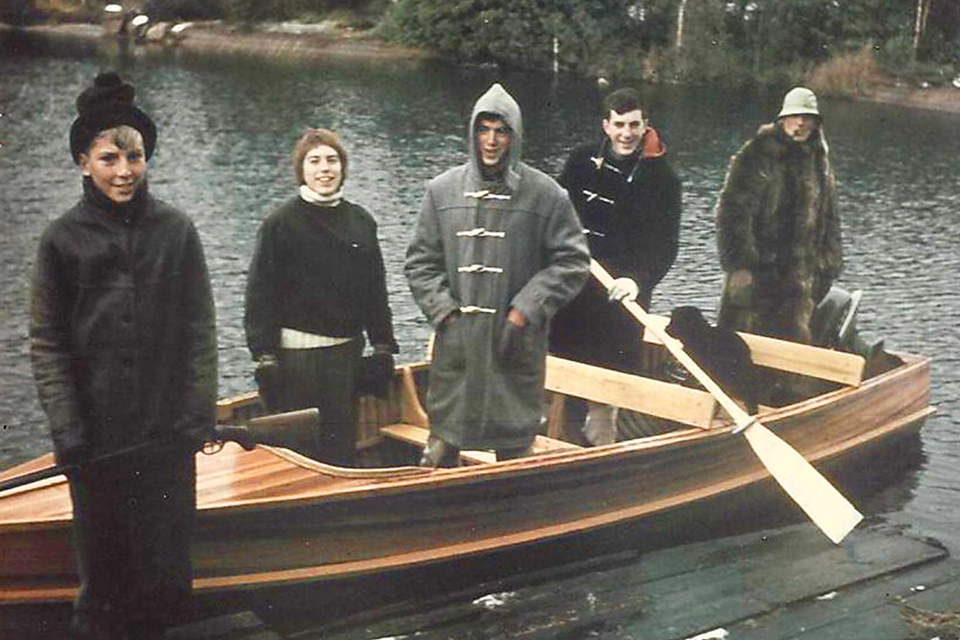
David Macfarlane is an acclaimed Canadian journalist and novelist. He originally published this essay in 1998. It is reprinted here with his permission. The cottage he describes was in Nares Inlet and his host was Tom Lawson, who had been Macfarlane’s English teacher at Trinity College School in Port Hope in the 1960s.
David Macfarlane’s latest book “Likeness”, a family memoir, will be published in Spring 2021 by Doubleday.
Thanks to Nick Ketchum, Tom Lawson’s brother-in-law, for the following photos: Photo 2: The Tom and Pat Lawson (Ketchum) cottage today. Photo 5: The Ketchum family Giesler, Thanksgiving 1952, shortly after its purchase. Phillip Ketchum is at the stern (in a racoon coat!) with some of his children (right to left): Tony, Crikey, Penny, and Nick. Photo 3: The Lawson Giesler is still running today for the Lawson family — David Macfarlane may have exaggerated its disrepair. Photos 1 and 4: Thanks to BNIA members Paul Nemy and Susan Buckley for these Bayfield-Nares photos.